Midweek Review
Mother of all challenges faced by SLPP!
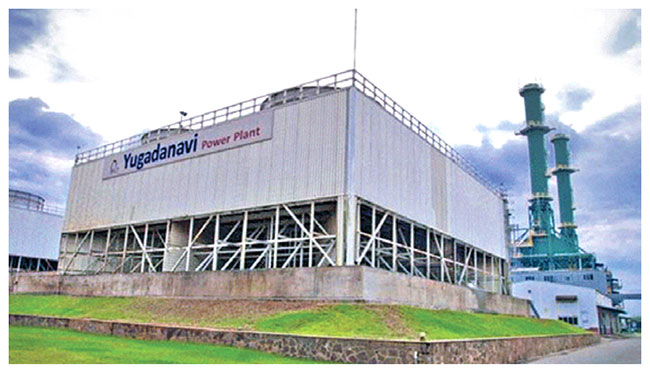
Yugadanavi legal wrangle:
By Shamindra Ferdinando
The Sri Lanka Podujana Peramuna (SLPP) government faces an overwhelming challenge from within, at the beginning of the New Year. The continuing dispute between the SLPP and a section of its constituent parties is threatening to overwhelm the ruling coalition over the backdoor offer by the New York-based US Company to purchase a 40 percent stake in Yugadanavi Power Plant, along with an almost monopoly status to supply LNG.
The SLPP appeared to have been caught off guard by three ministers, Vasudeva Nanayakkara (General Secretary, Democratic Left Front), Wimal Weerawansa (Leader, the National Freedom Front) and Attorney-at-Law Udaya Gammanpila (Leader, the Pivithuru Hela Urumaya), throwing their weight behind petitions against the deal. The three constituents have eight lawmakers in Parliament.
The Supreme Court will resume hearing the Fundamental Rights petitions challenging the Yugadanavi-related deals in the second week of January. A fuller bench of the SC heard those petitions on Dec 16 and 17, 2021. The next hearing is set for January 10, 2022, before a five-judge-bench consisting of Chief Justice Jayantha Jayasuriya, Justice Buwaneka Aluwihare, Justice Priyantha Jayawardena, Justice Vijith Malalgoda and Justice L.T.B. Dehideniya.
The Yugadanavi hearing will resume a week before Parliament meets again, following the much-debated prorogation. The President resorted to a tactical move in the wake of Janatha Vimukthi Peramuna (JVP) leader Anura Kumara Dissanayake tabling the hither to secret Yugadanavi agreement. The JVPer delivered a knockout blow a few hours before the vote on the 2022 Budget on Dec 10 evening.
President Gotabaya Rajapaksa prorogued Parliament immediately after the House approved the 2022 Budget. The Parliament is scheduled to meet again on January 18. Whatever the outcome of the Yugadanavi case, it’ll deliver a debilitating setback to the ruling coalition, struggling on several fronts. However, the relations between the two groups, in the coalition, have deteriorated so much, the SLPP and the rebellious partners may not be in a position to resolve their differences, out of Court. And if the differences are irreconcilable within the SLPP, the breakup of the coalition may become inevitable, especially with other dissenters in its own ranks, smarting from the fact they did not get any Cabinet portfolios to use the opportunity to teach the ruling clique a lesson. But they may very well end up cutting their proverbial nose to spite the face. But since the rebels took a principled and not a spiteful stand on the issue, both the President and PM will likely treat the partner rebellion as a storm in a tea cup. Premier Mahinda Rajapaksa has already stated in public that the rebel coalition partners have a right to dissent.
The declaration that Attorney General Sanjay Rajaratnam, PC, wouldn’t appear for the three ministers supporting the challenge, however, underscored the crisis within the government. They have retained private Counsel.
In addition to Prime Minister Mahinda Rajapaksa, the Cabinet of Ministers, New Fortress Energy Inc., West Coast Power (Private) Limited, the Ceylon Electricity Board, the AG is a respondent in this case.
The case is heard in terms of Article 132(3) of the Constitution. The petitioners are Samagi Jana Balavegaya General Secretary Ranjith Madduma Bandara, former JVP Parliamentarians Sunil
Hadunneththi and Wasantha Samarasinghe, Archbishop of Colombo Malcolm Cardinal Ranjith, Ven. Elle Gunawansa Thera and Viduli Sevaka Sangamaya have moved the Supreme Court against the agreements between the government and New Fortress Energy Inc., in relation to the sale of 40% of the shares of Yugadanavi Power Plant, located at Kerawalapitiya.
The petitioners said on 7th of July 2021, the framework agreement was signed between the government of Sri Lanka and New Fortress Energy Inc., for the disposal of 40% of the total shares held by West Coast Power (Private) Limited in the Yugadanavi (Pvt) Ltd for USD 250 million. Critics have repeatedly pointed out that there was nothing wrong in selling the 40 percent stake for that amount, the problem lay in the fact that New Fortress was also getting a monopoly status to supply LNG, ostensibly for five years, at the beginning, but who knows what would happen later on once they get themselves entrenched here with the corrupt bureaucracy and politicians.
Earlier both the CEB and Telecom were wrangled in so many corrupt deals, especially involving certain French multi-nationals, but many of them were undone especially during the tenure of former Prime Minister Ranil Wickremesinghe in the 1990s. Such deals were a drain on the private sector-friendly UNP government. So finally Western lenders themselves told the French enough was enough. It was a case of French selling us outdated equipment and charging us premium prices to keep them going. For example in those days after each heavy downpour many telephone lines in the country would go dead, but luckily for us all that was corrected with the privatisation of Telecom by Minister Mangala Samaraweera and clipping of the wings of the then all-powerful trade union UPTO. It was a classic case of trapping them using their greed.
The petitioners said agreements had been further entered for the execution of the Terminal Project which includes Floating Storage Regasification Unit (FSRU), Mooring system and the Pipelines, and the supply of Liquefied Natural Gas (LNG) to West Coast Power (Pvt) Ltd.
They state that to the best of their knowledge, the Share Sales and Purchase Agreement (SSPA) pertaining for the sale of 40% of the shares in West Coast Power (Pvt) Ltd., and the Gas Supply Agreements have not been placed before the Cabinet of Ministers to date.
Bundling the contracts for the Liquefied Natural Gas (LNG) terminal, construction of pipelines and Liquefied Natural Gas (LNG) supply in a single unsolicited proposal and awarding them to a foreign-based company, without following a transparent procedure, poses a serious threat to the national energy security of the country, they point out.
They said the proposal to purchase 40% of the shares in the West Coast Power (Private) Limited is contrary to the National Energy Policy and Strategies.
Manohara and Romesh on
opposing sides
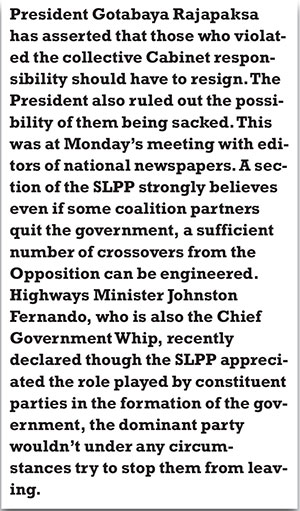 Perhaps, the top SLPP leadership believed the trio wouldn’t go the whole hog though they opposed the deal. However, following consultations among the rebel group, the DLF, NFF and PHU decided to challenge the Cabinet of ministers in the Supreme Court even at the risk of losing their ministerial portfolios. Their relationship with the dominant partner has been damaged severely. In fact, irreparable damage may have been caused.
Perhaps, the top SLPP leadership believed the trio wouldn’t go the whole hog though they opposed the deal. However, following consultations among the rebel group, the DLF, NFF and PHU decided to challenge the Cabinet of ministers in the Supreme Court even at the risk of losing their ministerial portfolios. Their relationship with the dominant partner has been damaged severely. In fact, irreparable damage may have been caused.
When the writer sought an explanation from Minister Gammanpila, one-time heavyweight of the Jathika Hela Urumaya (JHU), the lawmaker didn’t mince his words. “Whatever happens, we cannot remain committed to the so called collective responsibility of the Cabinet at the expense of national interest.
Dismissing the Attorney General’s stand vis-a-vis the defiant ministerial group, lawmaker Gammanpila declared that either those (three ministers) or the Attorney General had lied to the Supreme Court in respect of the Yugadanavi deal. Underscoring the fact that both represented the government, lawyer Gammanpila pointed out that in case the Supreme Court ruled one party furnished falsehood in an affidavit that party faced a three-year prison term.
The five-judge bench dismissed the Attorney General’s assertion that as the fundamental rights cases hadn’t been filed within the stipulated period, they should be dismissed. Having proposed to conduct proceedings on Dec 21 and 22 following hearings on Dec 16 and 17, judges put off the proceedings to January 10, 2022, on a request by the Attorney General. If not for the Attorney General’s plea, a lot more would have been in the public domain now.
Two of the country’s top lawyers, Manohara de Silva, PC and Romesh de Silva, PC, appeared for the opposing sides. Manohara, who openly campaigned against the yahapalana lot, appeared for petitioner Lanka Viduli Sevaka Sangamaya whereas Romesh represented respondent the Ceylon Electricity Board (CEB). The case has taken an unexpected turn with the disclosure of CEB Chairman M.C. Ferdinando’s controversial role in the whole process, particularly his endorsement of the agreement as an Advisor to the Finance Ministry. Ferdinando is the seventh among 73 respondents named in a petition filed by 12 persons represented by Manohara de Silva, PC. Interestingly, three Commissioners of the CIABOC (Commission to Investigate Allegations of Bribery or Corruption) are among the respondents.
What really made the submissions made by Manohara and Romesh interesting was their role in the new Constitution making process. The nine member expert team tasked with producing a draft constitution consists of Romesh de Silva (Chairperson), Gamini Marapana PC, Manohara de Silva PC, Sanjeewa Jayawardena PC, Prof. Naseema Kamurdeen, Dr. A. Sarveshwaran, Samantha Ratwatte PC, Prof. Wasantha Seneviratne and Prof. G.H. Peiris.
They haven’t been able to bring the process to a successful conclusion so far though the government repeatedly assured both in and out of Parliament, the draft Constitution would be presented by President Gotabaya Rajapaksa before completing two years in office. That failure cannot be blamed on the Covid-19 global epidemic. Silly efforts to blame everything on Covid-19 reached a new level when Provincial Council and Local Government State Minister Roshan Ranasinghe asserted that Local Government polls scheduled to take place before the third week of March 2022 was unlikely due to the threat posed by the new COVID variant Omicron.
Before examination of submissions made before the Supreme Court, it would be pertinent to mention that the Attorney General conceded before the five-judge bench the agreement on energy didn’t come within the laid down procurement process. The Attorney General, however, took up the stand that there is no basis for the case. Uditha Igalahewa, PC, appeared for the ministers.
Manohara issues dire warning
The Counsel for Lanka Viduli Sevaka Sangamaya has asserted in court that the Yugadanavi deal posed quite a threat to the sovereignty of the country as well as its national security. In response to Manohara’s warning, Attorney General Sanjaya Rajaratnam asked for the dismissal of cases without hearing them. The request was made on the basis the agreement being challenged outside the time allocated in terms of the Constitution. Manohara alleged that the then US Ambassador Alaina Teplitz interfered by lobbying on behalf of the US-based New Fortress Energy. Teplitiz, who recently completed her term in Colombo, had made representations on June 22, 2020, on behalf of the US Company to the Presidential Secretariat. The latter, in turn, has sent the US proposal to the Power and Energy Secretary along with a letter dated Jun 24, 2020. The letters signed by Telpitz and Dr. P.B. Jayasundera, respectively, for the US Embassy and the Presidential Secretariat have been presented to the Court. Manohara brought to the notice of the Court how the proposal made outside the laid down process undermined stability.
Accusing the US of interference in domestic affairs, Manohara explained how the US Ambassador sought to achieve their objectives with the help of corrupt Sri Lankan officials. This deal would create a US monopoly in the supply of LNG to Sri Lanka, Manohara predicted, asserting that the project created a dangerous situation. Alleging that the agreement betrayed national interests, the legal luminary painted a bleak picture of Sri Lanka’s future in case the deal materialised. Manohara questioned how the government entered into the agreement at the behest of the US even before the Chief Government Valuer provided his assessment pertaining to the Yugadanavi Power Plant. Romesh de Silva responded asserting that a proper valuation had been done before the signing of the agreement took place.
Those who were represented by Manohara in their petition stated that the Ceylon Electricity Board informed the Secretary to the Ministry of Power by letter dated 07.07.2021 that competitive open international tendering for the supply of Liquefied Natural Gas to Sri Lanka had already commenced and that to entertain an arbitrary proposal presented by an independent party who is not a party to the procurement process would adversely affect the transparency and fairness of the procurement process. In spite of that, Treasury Secretary S.R. Attygalle signed the Framework Agreement on July 07, 2021, to pave the way the sale of 40 percent shares of the power station owned by the government.
The share structure of the power station comprises; the government 50%, Employees’ Provident Fund 27%, Lanka Electricity Company 18% and LTL Holdings 5%.
SLFP takes questionable stand
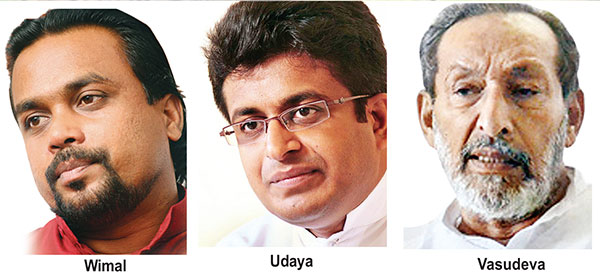
In spite of backing the rebel ministers’ cause against the Sri Lanka-US deal, the Sri Lanka Freedom Party (SLFP) conveniently skipped an opportunity to join the Supreme Court action. The SLFP parliamentary group consists of 14 members. The second biggest constituent in the 145-member government Parliamentary Group, the SLFP owed an explanation why at least one of its ministers, out of the two, namely Nimal Siripala de Silva or Mahinda Amaraweera failed to join the rebellious colleagues, Vasudeva Nanayakkara, Wimal Weerawansa and Udaya Gammanpila, in their principled stand against the controversial deal. General Secretary of the SLFP Dayasiri Jayasekera, however, flayed Yugadanavi agreement at the launch of a high profile campaign, on Oct 29, at Solis Hall, Pitakotte.
In an interview with political weekly Anidda in its Dec 26, 2021 edition, lawmaker Jayasekera, having challenged the legality of the Yugadanavi deal, vowed not to allow the implementation of the energy project, under any circumstances. The SLFPer strongly rejected the stand taken by Chief Government Whip Johnston Fernando as regards the Yugadanavi agreement.
If the SLFP is sincere of its position vis-a-vis the US energy deal, former President Maithripala Sirisena, MP, should have given his party the go ahead to join the challenge in the Supreme Court. The SLFP’s participation in legal action would have certainly strengthened the case against the Cabinet of ministers. Anidda interviewer should have sought an explanation from lawmaker Jayasekera over the SLFP not being part of the real opposition to the Yugadanavi deal.
Veteran politician Vasudeva Nanayakkara recently referred to those who backed Yugadanavi, opposed it and then took a sort of neutral stand. Was he referring to the SLFP? In addition to the DLF, the NFF and the PHU that have challenged the Cabinet of ministers over the Yugadanavi deal, SLFP, Communist Party, LSSP, Yuthukama civil society and National List MP Tiran Alles have declared opposition to the same. Of the 225 lawmakers, approximately 25 elected and appointed on the SLPP National List are believed to be opposed in line with the decision taken by their respective parties. In addition to them, Ven. Athureliye Rathana, National List MP of Ape Jana Bala Pakshaya backs the campaign.
A govt. in turmoil
The Yugadanavi crisis is just one among a spate of issues gravely troubling the government. The cash-strapped regime sought to project the Yugadanavi deal as a success primarily on the basis it would please the ever antagonistic Washington and the US firm paying USD 250 mn in two installments. Those who support the project propagate the line or lie that the deal would make available electricity at a much cheaper rate. There had never been a previous agreement that ended up having a section of Cabinet ministers who represent the legislature moving Court against their colleagues. The issue should be examined taking into consideration that the President is the head of the Cabinet. Where does the President stand? Did the appearance of CEB Chairman M.C. Ferdinando at a special media briefing arranged by the Presidential Media Division (PMD) signifies the President’s stand? In case the Supreme Court ruling pertaining to Yugadanavi petitions goes against the government, what will it do? Is there a fallback position? What will become of the SLPP’s relationship with those who opposed the project?
The much-debated ‘One Country, One Law’ concept has caused controversy primarily due to the appointment of Ven. Galagodaatte Gnanasara Thera, the recipient of presidential pardon from previous President Sirisena, after his ruffian behaviour even in a court of law, as the head of the relevant Presidential Task Force. The handling of State Minister Ratwatte’s inexcusable behaviour at the Welikada and Anuradhapura prisons badly exposed the government.
The government will have to address a series of other issues with the daunting challenge in servicing foreign and local debt as well as ruination of the Maha crop as a result of the hasty ban on agro-chemicals. The sacking of Agriculture Secretary Senior Prof. Udith J. Jayasinghe has prompted the angry official to fire a broadside at the government. The government appeared to have been sort of surprised by Prof. Jasasinghe’s response. The SJB has lambasted Prof. Jayasinghe and held him and the SLPP political leadership responsible for the crisis whereas the former now portrayed himself as the one who represented the interests of the public.
The government cannot depend on its overwhelming parliamentary majority to overcome the crises. Actually, the near 2/3 majority does not mean a thing as the government continues to weaken itself by utterly misplaced strategies. The SLPP is in such a desperate situation, the situation cannot be overcome or public attention diverted by propaganda on mainstream or social media.
Midweek Review
AKD’s Jaffna visit sparks controversy
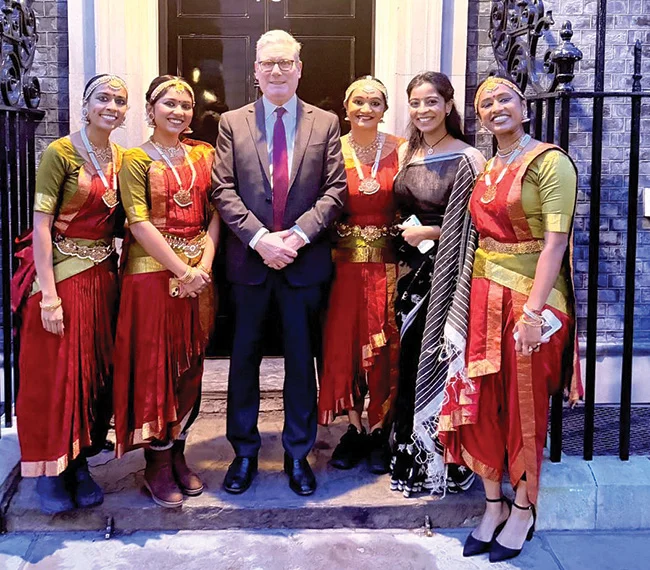
President Anura Kumara Dissanayake’s (AKD) recent visit to Jaffna received significant social media attention due to posting of a less than a minute-long video of him going for a walk there.
An unarmed soldier was captured walking beside AKD who is also the Commander-in-Chief of the armed forces in addition to being the Defence Minister. A soldier carrying an assault rifle was seen walking behind AKD. There was another soldier in a pair of shorts walking just behind the President. AKD’s Personal Security Officer (PSO) was not on that video. By January 26th morning that video received 378 K ‘hits’ and 9.8 K reactions.
AKD was in a pair of shorts and running shoes. There hadn’t been a previous occasion in which AKD was captured in a pair of shorts during his time as a lawmaker or the President. AKD was there on a two-day visit that coincided with Thai Pongal.
AKD’s latest visit to Jaffna for Thai Pongal caused a huge controversy when he declared that those who visited Buddhist shrines there influenced and encouraged hate. “Coming to Jaffna to observe sil on a Poya Day, while passing the Sri Maha Bodhi, is not virtue, but hatred,” AKD declared. The utterly uncalled for declaration received the wrath of the Buddhists. What made AKD, the leader of the JVP, a generally avowed agnostics, as well as NPP, to make such an unsubstantiated statement?
Opposition political parties did not waste much time to exploit AKD’s Jaffna visit to their advantage. They accused AKD of betraying the majority Buddhists in the country. Those who peruse social media know how much AKD’s Jaffna talk angered the vast majority of people aware of the sacrifices made by the armed forces and police to eradicate terrorism.
If not for the armed forces triumph over the LTTE in May 2009, AKD would never have ended up in the Office of the President. That is the undeniable truth. Whatever, various interested parties say, the vast majority of people remember the huge battlefield sacrifices made by the country’s armed forces that made the destruction of the LTTE’s conventional military power possible. Although some speculated that the LTTE may retain the capability to conduct hit and run attacks, years after the loss of its conventional capacity, the group couldn’t stage a comeback, thanks to eternal vigilance and the severity of its defeat.
AKD’s attention-grabbing Jaffna walk is nothing but a timely reminder that separatist Tamil terrorism had been defeated, conclusively. Of course, various interested parties may still propagate separatist views and propaganda but Eelam wouldn’t be a reality unless the government – whichever political party is in power – created an environment conducive for such an eventuality.
The JVP/NPP handsomely won both the presidential and parliamentary polls in Sept. and Nov. 2024, respectively. Their unprecedented triumph in the Northern and Eastern provinces emboldened their top leadership to further consolidate their position therein at any cost. However, an unexpected and strong comeback made by one-time LTTE ally, the TNA, appeared to have unnerved the ruling party. On the other hand, the TNA, too, seems to be alarmed over AKD’s political strategy meant to consolidate and enhance his political power in the North.
Perhaps, against the backdrop of AKD’s Jaffna walk, we should recollect the capture of Jaffna, the heart of the separatist campaign during President Chandrika Bandaranaike Kumaratunga’s time. Jaffna town was regained in the first week of December, 1995, 11 years before the outbreak of Eelam War IV (August 2006 to May 2009).
Operation Riviresa
In the run-up to the January 2015 presidential election, Kumaratunga, who served two terms as President (1994 to 1999 and 2001 to 2005), declared that her administration liberated 75% of the territory held by the LTTE. That claim was made in support of Maithripala Sirisena’s candidature at the then presidential election. Kumaratunga joined hands with the UNP’s Ranil Wickremesinghe, the JVP (NPP was formed in 2019), the SLMC and the TNA to ensure Sirisena’s victory.
Liberating 75% of territory held by the LTTE was nothing but a blatant lie. That claim was meant to dispute war-winning President Mahinda Rajapaksa’s bid for a third term. Ahead of the 2005 presidential election, Kumaratunga’s administration lost the capacity to conduct large-scale ground offensives in the Northern theatre of operations. In fact, the last major offensive, codenamed Agni Kheelsa in April 2001, had been undertaken in the Jaffna peninsula where the Army suffered debilitating losses, both in men and material. That was President Kumaratunga’s last attempt to flex military muscle. But, she should be credited for whole-heartedly supporting Operation Riviresa (Aug. to Dec. 1995) that brought back Jaffna under government control.
In spite of several major attempts by the LTTE to drive the Army out of Jaffna, the military held on. The largest ever combined security forces offensive, under President Mahinda Rajapaksa, with the Navy and Air Force initiating strategic action against the LTTE and the triumph over separatist terrorism in two months short of three years, should be examined taking into consideration the liberation of the Jaffna peninsula and the islands.
If President Kumaratunga failed to bring Jaffna under government control in 1995 and sustain the military presence there, regardless of enormous challenges, the war wouldn’t have lasted till 2006 and the outcome of the war could have gone the other way much earlier. Whatever the criticism of Kumaratunga’s rule, liberating the Jaffna peninsula is her greatest achievement. Regardless of financial constraints, Kumaratunga and her clever and intrepid Treasury Secretary, the late A.S. Jayawardena, provided the wherewithal for the armed forces to go on the offensive. After the successful capture of Jaffna, by the end of 1995, Kumaratunga ordered Kfirs and MiG 27s, and a range of other weapons, including Multi Barrel Rocket Launchers (MBRLs), to enhance the fire power, but the military couldn’t achieve the desired results. While she provided any amount of jaw, jaw, it was Amarananda Somasiri Jayawardena who ensured that the armed forces were provided with the necessary wherewithal, under difficult circumstances, especially in the aftermath of the later humiliating Wanni debacle, when he was the Central Bank Governor.
AKD is certainly privileged to engage in morning exercises in a terrain where some of the fiercest battles of the Eelam conflict were fought, involving the Indian Army, as well as other Tamil groups, sponsored by New Delhi, in the ’80s.
When the Army secured Jaffna, in 1995, and lost Elephant Pass in 2000, the forward defence lines had to be re-established and defended at great cost to both men and material. By then, the Vanni had become the LTTE stronghold and successful ground offensive seemed impossible but under President Mahinda Rajapaksa’s political leadership the combined armed forces achieved the unthinkable – the annihilation of the LTTE in a way it couldn’t make a comeback at any level. AKD’s post that went viral recently is evidence that peace has been restored and maintained for the Commander-in-Chief to take a walk on a Jaffna street.
Social media comments on AKD’s Jaffna walk reflected public thinking, especially against the backdrop of that unwarranted claim regarding Buddhists influencing hatred by visiting Jaffna on a Poya Day to observe sil, having passed the Sri Maha Bodhi.
UK anti-SL campaign
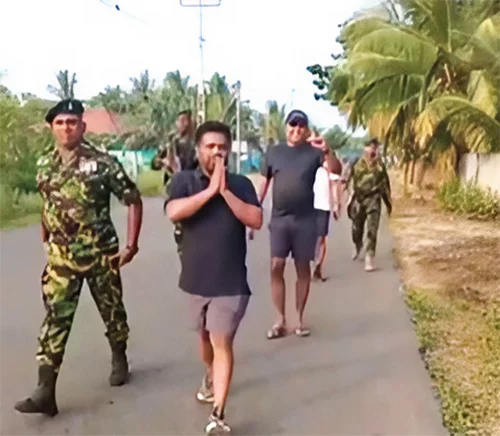
President Dissanayake taking a walk
It would be pertinent to ask the Sri Lanka High Commission in the UK regarding action taken to counter the continuing propaganda campaign against the country. Sri Lankan HC in the UK Nimal Senadheera owed an explanation as UK politicians seemed to be engaged in a stepped-up Sri Lanka bashing with the NPP government not making any effort to counter such propaganda against our country.
Interestingly, the UK government is on a collision course with no less a person than President Donald Trump over his recent humiliating comments on NATO troops who fought alongside the Americans in Afghanistan.
British Prime Minister Keir Starmer is on record as having said that President Trump’s comments were “insulting and frankly appalling.” Starmer suggested the US President apologise for his remarks. Amidst strong protests by humiliated NATO countries, President Trump retracted his derogatory comments.
But the UK’s position with regard to Tamil terrorism that also claimed the lives of nearly 1,500 Indian officers and men seemed different. The UK continues to ignore crimes perpetrated by the LTTE, including rival Tamil groups, political parties and Tamil civilians.
The Labour Party that promoted and encouraged terrorism throughout the war here raised the post-war Sri Lanka situation again.
The Labour Party questioned the British government in the House of Commons recently on what action it was taking to support Tamils seeking justice for past and ongoing abuses in Sri Lanka.
Raising the issue on 20 January 2026, Peter Lamb, the Labour MP for Crawley, asked: “What action is the UK Government taking to support Tamils in seeking justice for past and current injustices?”
Responding on behalf of the government, Hamish Falconer, Parliamentary Under-Secretary of State at the Foreign, Commonwealth and Development Office, said the UK remained actively engaged in accountability for crimes committed against the Tamil people.
“The UK is active in seeking justice and accountability for Sri Lanka’s Tamil community,” Falconer told the House. He said Britain continues to play a leading role at the United Nations Human Rights Council on resolutions addressing Sri Lanka’s human rights record.
Falconer added that the UK had taken concrete steps in recent years, including imposing sanctions. “Last year, we sanctioned Sri Lankans for human rights violations in the civil war,” he said, referring to measures targeting individuals implicated in serious abuses.
He also stated that the UK had communicated its expectations directly to Colombo. “We have made clear to the Sri Lankan Government the importance of improved human rights for all in Sri Lanka, as well as reconciliation,” Falconer said.
Concluding his response, Falconer marked the Tamil harvest festival, adding, “Let me take the opportunity to wish the Tamil community a happy Thai Pongal.”
The UK cannot be unaware that quite a number of ex-terrorists today carry British passports.
David Lammy’s promise
Our High Commissioner in London Nimal Senadheera, in consultation with the Foreign Ministry in Colombo, should take up the Parliamentary Under-Secretary of State at the Foreign, Commonwealth and Development Office Hamish Falconer’s comment on sanctions imposed on Sri Lankans in March 2025. Falconer was referring to General (retd.) Shavendra Silva, Admiral of the Fleet Wasantha Karannagoda, General (retd), Jagath Jayasuriya and one-time LTTE commander Vinayagamoorthy Muralitharan, aka Karuna Amman.
The then Secretary of State for Foreign, Commonwealth and Development Affairs, David Lammy, declared in March 2025 that the above-mentioned Sri Lankans were sanctioned in line with election promises. A UK government statement quoted Lammy as having said: “I made a commitment during the election campaign to ensure those responsible are not allowed impunity. This decision ensures that those responsible for past human rights violations and abuses are held accountable.”
Since then David Lammy has received the appointment as Lord Chancellor, Secretary of State for Justice and Deputy Prime Minister.
Recent Thai Pongal celebrations held at 10 Downing Street for the second consecutive year, too, was used to disparage Sri Lanka with reference to genocide and Tamils fleeing the country. They have conveniently forgotten the origins of terrorism in Sri Lanka and how the UK, throughout the murderous campaign, backed terrorism by giving refuge to terrorists.
The British had no qualms in granting citizenship to Anton Balasingham, one-time translator at the British HC in Colombo and one of those who had direct access to LTTE leader Velupillai Prabhakaran. Balasingham’s second wife, Australian-born Adele, too, promoted terrorism and, after her husband’s demise in Dec 2006, she lives comfortably in the UK.
Adele had been captured in LTTE fatigues with LTTE women cadres. The possibility of her knowing the LTTE suicide attack on former Indian Prime Minister Rajiv Gandhi in May 1991 can never be ruled out.
With the British PM accommodating those campaigning against Sri Lanka at 10 Downing Street and the Deputy PM openly playing politics with the issues at hand, Sri Lanka is definitely on a difficult wicket.
Sri Lanka has chosen to appease all at the expense of the war-winning military. The NPP government never made a genuine effort to convince Britain to rescind sanctions imposed on three senior ex-military officers and Karuna. The British found fault with Karuna because he switched allegiance to the Sri Lankan military in 2004. The former eastern commander’s unexpected move weakened the LTTE, not only in the eastern theatre of operations but in Vanni as well. Therefore, the British in a bid to placate voters of Sri Lankan origin, sanctioned Karuna while accommodating Adele whose murderous relationship with the LTTE is known both in and outside the UK Parliament.
Some British lawmakers, in a shameless and disgraceful manner, propagated lies in the UK Parliament for obvious reasons. Successive governments failed to counter British propaganda over the years but such despicable efforts, on behalf of the LTTE, largely went unanswered. Our governments lacked the political will to defend the war-winning armed forces. Instead, the treacherous UNP and the SLFP got together, in 2015, to back a US-led accountability resolution that sought to haul Sri Lanka up before the Geneva-based United Nations Human Rights Council (UNHRC).
The possibility of those who propagated lies receiving monetary benefits from interested parties cannot be ruled out. Sri Lanka never bothered to counter unsubstantiated allegations. Sri Lanka actually facilitated such contemptible projects by turning a blind eye to what was going on.
The Canadian Parliament declaration that Sri Lanka perpetrated genocide during the conflict didn’t surprise anyone. The 2022 May announcement underscored Sri Lanka’s pathetic failure on the ‘human rights’ front. The Gotabaya Rajapaksa government struggling to cope with the massive protest campaign (Aragalaya) never really addressed that issue. Ranil Wickremesinghe, who succeeded Gotabaya Rajapaksa in July 2022, too, failed to take it up with Canada. The NPP obviously has no interest in fighting back western lies.
The Canada Parliament is the first national body to condemn Sri Lanka over genocide. It wouldn’t be the only parliament to take such a drastic step unless Sri Lanka, at least now, makes a genuine effort to set the record straight. Political parties, representing our Parliament, never reached a consensus regarding the need to defeat terrorism in the North or in the South. Of those elected representatives backed terrorism in the North as well as terroirism in the South. Perhaps, they have collectively forgotten the JVP terrorism that targeted President JRJ and the entire UNP Parliamentary group. The JVP attack on the UNP, in parliament, in August 1987, is a reminder of a period of terror that may not have materialised if not for the Indian intervention.
By Shamindra Ferdinando
Midweek Review
Some heretical thoughts on educational reforms

The term education originates from the Latin words ‘educare’, meaning ‘to bring up’, and educere, meaning ‘to bring forth’. The precise definition of education is disputed. But if it is linked with the obvious expected outcome of it – learning, then the definition of education changes to a resultant outcome of ‘a change in behaviour’.
Let me say this at the outset. I am not going to get embroiled in the nitty-gritty pros and cons of the current controversies hogging the headlines today. Except to say this. As every discerning and informed person says, we need educational reforms. There is near unanimity on that. It is the process – a long, and even tedious process – that needs to be carried out that gives rise to disagreements and controversy. A public discussion, stakeholder viewpoints and expert opinion should be given due time and consideration.
Sex education – “the birds and bees” to start with – has to be gradually introduced into school curricular. When? is the critical question that needs specific answers. Do we need to go by Western standards and practices or by a deep understanding of our cultural milieu and civilisational norms? One thing is clear in my mind. Introduction of sex education into school curricular must not be used – or abused – to make it a ‘freeway’ for indiscriminate enforcement of the whole human sexual spectrum before the binary concepts of human sexuality has been clearly understood by children – especially during their pre-pubertal and immediate post-pubertal adolescent years. I have explicitly argued this issue extensively in an academic oration and in an article published in The Island, under the title, “The child is a person”.
Having said that, let me get on to some of my heretical thoughts.
Radical thinkers
Some radical thinkers are of the view that education, particularly collective education in a regulated and organised school system, is systematic streamlined indoctrination rather than fostering critical thinking. These disagreements impact how to identify, measure, and enhance various forms of education. Essentially, what they argue is that education channels children into pliant members of society by instilling existing or dominant socio-cultural values and norms and equipping them with the skills necessary to become ‘productive’ members of that given society. Productive, in the same sense of an efficient factory production line.
This concept was critiqued in detail by one of my favourite thinkers, Ivan Illych. Ivan Illich (1926 – 2002) was an Austrian philosopher known for his radical polemics arguing that the benefits of many modern technologies and social arrangements were illusory and that, still further, such developments undermined humans’ image of self-sufficiency, freedom, and dignity. Mass education and the modern medical establishment were two of his main targets, and he accused both of institutionalising and manipulating basic aspects of life.
One of his books that stormed into the bookshelves that retains particular relevance even today is the monumental heretical thought ‘Deschooling Society’ published in 1971 which became his best-known and most influential book. It was a polemic against what he called the “world-wide cargo cult” of government schooling. Illich articulated his highly radical ideas about schooling and education. Drawing on his historical and philosophical training as well as his years of experience as an educator, he presented schools as places where consumerism and obedience to authority were paramount. Illich had come to observe and experience state education during his time in Puerto Rico, as a form of “structured injustice.”
‘Meaningless credentials’
Ilych said that “genuine learning was replaced by a process of advancement through institutional hierarchies accompanied by the accumulation of largely meaningless credentials”. In place of compulsory mass schooling, Illich suggested, “it would be preferable to adopt a model of learning in which knowledge and skills were transmitted through networks of informal and voluntary relationships”. Talking of ‘meaningless credentials’ it has become the great cash-cow of the education industry the world over today – offering ‘honorary PhDs’ and ‘Dr’ titles almost over the counter. For a fee, of course. I wrote a facebook post titled “Its raining PhDs!”.
Mass education and the modern medical establishment were two of his main targets, and he accused both of institutionalising and manipulating basic aspects of life. I first got to ‘know’ of him through his more radical treatise “Medical Nemesis: The expropriation of Health”, that congealed many a thought that had traversed my mind chaotically without direction. He wrote that “The medical establishment has become a major threat to health. The disabling impact of professional control over medicine has reached the proportions of an iatrogenic epidemic”. But it was too radical a thought, far worse than ‘Deschooling Society’. The critics were many. But that is not our topic for the day.
The other more politically radical views on education comes from Paul Freire. Paul Freire (1921 – 1997) was a Brazilian educator and Marxist philosopher whose work revolutionised global thought on education. He is best known for his 1968 book “Pedagogy of the Oppressed” in which he reimagines teaching as a “collaborative act of liberation rather than transmission”. A founder of critical pedagogy, Freire’s influence spans literary movements, liberation theology, postcolonial education, Marxism, and contemporary theories of social justice and learning. He is widely regarded as one of the most important educational theorists of the twentieth century.
Neutral education process?
Richard Shaull, in his introduction to the 13th edition of ‘Pedagogy of the Oppressed’ wrote: “There is no such thing as a neutral education process. Education either functions as an instrument which is used to facilitate the integration of generations into the logic of the present system and bring about conformity to it, or it becomes the “practice of freedom”, the means by which men and women deal critically with reality and discover how to participate in the transformation of their world”.
Here are a few quotes from Paul Freire before I revert to the topic I began to write on: “Liberating education consists in acts of cognition, not transferals of information.”; he believed that “true liberation comes from the oppressed taking agency and actively participating in the transformation of society”; he viewed “education as a political act for liberation – as the practice of freedom for the oppressed.”; He said that “traditional education is inherently oppressive because it serves the interests of the elite. It helps in the maintenance of the status quo.”
Where does our own ‘educational reforms’ stand? Is it transference, transformative, liberating or an attempt at maintaining the status quo with the help of the ADB? The history of educational reforms in Sri Lanka has been long. A quick check on the internet elicited the following:
Colonial Era (Pre-1940s): Colebrooke-Cameron Commission (1830s): Promoted English and standardised curriculum, laying groundwork for modern systems.
Buddhist Revival: Efforts by Anagarika Dharmapala to establish schools with Buddhist principles and English education.
The Kannangara Reforms (1940s): 1943 – Minister C.W.W. Kannangara introduced free education for all funded by general taxes; 1947 – introduced it from kindergarten to university. Central Schools (Madhya Maha Vidyalayas) established high-quality secondary schools in rural areas to ensure equitable access. Medium of Instruction was mandated to be the national languages (Sinhala and Tamil) for primary education.
Nationalisation and Standardisation
Nationalisation and Standardisation (1960s-1970s): 1961 – Denominational schools were taken over by the government to create a national education system. 1972 – New attempts at reform introduced following the 1971 youth uprising, focusing on democratising education and practical skills through a common curriculum and a national policy, responding to socio-economic needs. Introduction of language-based standardisation that in all likelihood triggered the ‘separatist war’. 1978 – change from language-based standardisation to district-based standardisation on a quota system for university entrance that was first introduced with a promise for only ten years, but persists until today, for nearly 50 years. No government dares to touch it as it is politically explosive.
Focus on quality and access (1980s-1990s): White Paper on Education (1981) – aimed to modernise the system together with components of privatising higher education. It faced severe criticism and public protests for its clear neoliberal leanings. And it never got off the ground. The National Colleges of Education (1986) were established.
1987 – Devolution of education power to provincial councils. 1991 – Establishment of The National Education Commission created to formulate long-term national policies. 1997 – Comprehensive reforms through a Presidential Task Force to overhaul the general education system (Grades 1-13), including early childhood development and special and adult education.
21st Century Reforms (2000s-Present): Mid-1990s-early 2000s – focused on transforming education from rote learning to competency-based, problem-solving skills; emphasising ICT, English, equity, and aligning education with labour market needs; introducing school restructuring (junior/senior schools) and compulsory education for ages 5-14; and aiming for national development through development of human capital.
Modernising education
2019 educational reforms focused on modernising education by shifting towards a modular, credit-based system with career pathways, reducing exam burdens, integrating vocational skills, and making education more equitable, though implementation details and debates around cultural alignment continued. Key changes included introducing soft skills and vocational streams from Grade 9/10; streamlining subjects, and ensuring every child completes 13 years of education; and moving away from an excessive focus on elite schools and competitive examinations.
This government is currently implementing the 2019 reforms in the National Education Policy Framework (2023–2033), which marks a radical departure from traditional methods. Module-Based System and a shift from exam-centric education to a module-based assessment system starting in 2026.
Already we have seen multi-pronged criticisms of these reforms. These mainly hinge on the inclusion – accidentally or intentionally – of a website for adult male friend groups. The CID is investigating whether it was sabotage.
Restricting access to social media
When there is a global concern on the use of smartphones and internet by children, and where Australia has already implemented a new law in December 2025 banning under-16s from major social media platforms to protect children from cyberbullying, grooming, and addiction, requiring tech companies to use age verification.
The U.S. does not have a federal law banning smartphones for under-16s, but a major movement, fuelled by the US Surgeon-General warnings and research on youth mental health, is pushing for restrictions, leading many individual states (like California, Florida, Virginia) to enact laws or guidelines for school-day bans or limits for students, focusing on classroom distraction and social media risks, with some advocates pushing for no smartphones before high school or age 16.
The UK doesn’t currently have a legal ban on smartphones for under-16s, but there’s significant political and public pressure for restrictions, with debates focusing on social media access and potential school bans, with some politicians and experts advocating bans similar to Australia’s, while others push for stronger regulations under the existing Online Safety Act to protect children from addictive algorithms and harm.
Sweden is implementing a nationwide ban on mobile phones in schools for students aged 7 to 16, starting in autumn 2026, requiring devices to be handed in until the school day ends to improve focus, security, and academic performance, as part of a major education reform. This national law, not just a recommendation, aims to reduce distractions and promote traditional learning methods like books and physical activity, addressing concerns about excessive screen time affecting children’s health and development.
Norway doesn’t have a complete smartphone ban for under-16s but is moving to raise the minimum age for social media access to 15 and has implemented strong recommendations, including a ban on phones in schools to protect children from harmful content and digital overexposure, with studies showing positive impacts on focus and well-being. The government aims to shield kids from online harms like abuse and exploitation, working with the EU to develop age verification for platforms like TikTok and Instagram.
Finland implemented a law in August 2025 restricting smartphone use for students aged 7-16 during the school day, empowering teachers to ban devices in classrooms, meals, and breaks, except for educational or health reasons, to combat distractions, improve focus, and support student well-being and social skills. The move aims to create calmer learning environments, reduce cyberbullying, and encourage more in-person interaction, giving teachers control to confiscate disruptive phones, though digital tools remain part of education.
Trend in liberal west
When this is the trend in the ‘liberal West’ on the use of smartphones by children in schools, did not our educational reform initiators, experts and pundits in the NIE not been observing and following these worldwide trends? How could they recommend grade 6 children to go to (even a harmless legitimate) website? Have they been in hibernation when such ‘friend/chat room’ sites have been the haunt of predatory paedophile adults? Where have they been while all this has been developing for the past decade or more? Who suggested the idea of children being initiated into internet friends chat rooms through websites? I think this is not only an irresponsible act, but a criminal one.
Even if children are given guided, supervised access to the internet in a school environment, what about access to rural children? What about equity on this issue? Are nationwide institutional and structural facilities available in all secondary schools before children are initiated into using the internet and websites? What kind of supervision of such activities have been put in place at school (at least) to ensure that children are safe from the evils of chat rooms and becoming innocent victims of paedophiles?
We are told that the new modular systems to be initiated will shift assessments from an exam-centric model to a modular-based, continuous assessment system designed to prioritise skill development, reduce stress, and promote active learning. The new reforms, supposed to begin in 2026, will introduce smaller, self-contained learning modules (covering specific topics or themes) with integrated, ongoing assessments.
Modular assessment and favouritism
I will not go into these modular assessments in schools in any detail. Favouritism in schools is a well-known problem already. 30% of final assessments to be entrusted to the class teacher is a treacherous minefield tempting teachers into corrupt practices. The stories emanating from the best of schools are too many to retell. Having intimate knowledge of what happens to student assignment assessments in universities, what could happen in schools is, to me, unimaginable. Where do the NIE experts live? In Sri Lanka? Or are they living in ideal and isolated ivory towers? Our country is teeming with corruption at every level. Are teachers and principals immune from it? Recently, I saw a news item when a reputed alumnus of “the best school of all” wrote a letter to the President citing rampant financial corruption in the school.
This article is already too long. So, before I wind up, let me get on to a conspiracy theory. Why have the World Bank and the ADB been pumping millions of USD into ‘improving’ our education system?
World Bank
The World Bank is the largest source of external financing for education in developing countries, maintaining an active portfolio of approximately $26 billion in 94 countries reaching an estimated 425 million students— roughly one-third of all students in low- and middle-income countries.
The World Bank funds education globally through loans, grants, and technical assistance to improve access, quality, and equity, focusing on areas like teacher training, digital infrastructure, and learning outcomes, with significant recent investment in Fragile, Conflict, and Violence (FCV) settings and pandemic recovery efforts. Funding supports national education strategies, like modernising systems in Sri Lanka, and tackles specific challenges such as learning loss, with approaches including results-based financing and supporting resilient systems. Note this phrase – ” … with significant recent investment in Fragile, Conflict, and Violence (FCV) settings ….”. The funds are monumental for FCV Settings – $7 billion invested in Fragile, Conflict, and Violence settings, with plans for $1.2 billion more in 2024-25. Now with our Ditwah disaster, it is highly fertile ground for their FCV investments.
Read Naomi Kline’s epic “The Shock Doctrine: The rise of disaster capitalism”. It tells it all. It must be read and digested to understand the psychology of funding for FCV settings.
The 40.3 million USD World Bank’s IRQUE (Improving Relevance and Quality of Undergraduate Education) Project in Sri Lanka (circa 2003-2009) was a key initiative to modernize the country’s higher education by boosting quality, accountability, and relevance to the job market, introducing competitive funding (QEF), establishing Quality Assurance (QA) functions for the first time, and increasing market-oriented skills, significantly reducing graduate unemployment. I was intimately involved in that project as both Dean/Medicine and then VC of University of Ruhuna. Again, the keywords ‘relevance to the job market’ comes to mind.
The Asian Development Bank (ADB) is heavily funding education reform in Sri Lanka, notably with a significant $400 million loan (Secondary Education Sector Improvement Program – SESIP) to transform secondary education, aligning it with global knowledge economy demands, improving curriculum, teacher training, and infrastructure for quality access. ADB also provides ongoing support, emphasising teacher training, digital tech, and infrastructure, viewing Sri Lanka’s youth and education as crucial for development. The keywords are ‘aligning it with global knowledge economy demands’. As of 2019, ADB loans for education totalled approximately $1.1 billion, with cumulative funding for pre-primary, primary, and secondary education exceeding $7.4 billion since 1970 in the Asia-Pacific region.
Radical view of IMF and WB
A radical view of the Bretton Woods twins – the International Monetary Fund (IMF) and the World Bank – and the ADB characterises them not as neutral facilitators of global economic stability and egalitarian economic development in poor countries, but as tools of Western hegemony, neoliberal imposition, and institutionalized inequality. From this perspective, these institutions, created to manage the post-WWII economic order, have evolved into instruments that perpetuate the dominance of the Global North over the Global South.
The World Bank and the ADB (in our part of the world) have been investing heavily on education reform in poor countries in Asia and Africa. Why? Surely, they are not ‘charity organisations’? What returns are they expecting for their investments? Let me make a wild guess. The long-term objective of WB/ADB is to have ‘employable graduates in the global job market’. A pliant skilled workforce for exploitation of their labour. Not for “education as a political act for liberation” as Paul Freire put it.
I need to wind up my heretical thoughts on educational reform. For those of us who wish to believe that the WB and ADB is there to save us from illiteracy, poverty and oppression, I say, dream on.
“Don’t let schooling interfere with your education. Education consists mainly of what we have unlearned.” – Mark Twain
by Susirith Mendis
Susmend2610@gmail.com
Midweek Review
A View from the Top
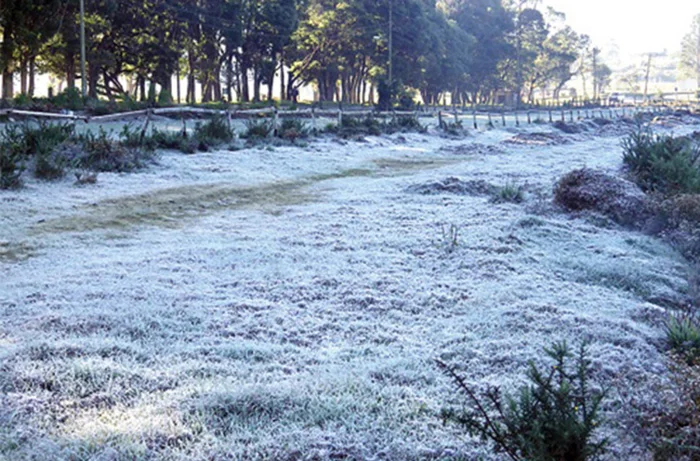
They are on a leisurely uphill crawl,
These shiny, cumbrous city cars,
Beholding in goggle-eyed wonder,
Snow gathering on mountain tops,
Imagining a once-in-a-lifetime photo-op,
But the battered land lying outside,
Gives the bigger picture for the noting eye,
Of wattle-and-daub hut denizens,
Keeping down slowly rising anger,
On being deprived the promised morsel.
By Lynn Ockersz
-

 Business4 days ago
Business4 days agoComBank, UnionPay launch SplendorPlus Card for travelers to China
-

 Business5 days ago
Business5 days agoComBank advances ForwardTogether agenda with event on sustainable business transformation
-

 Opinion5 days ago
Opinion5 days agoConference “Microfinance and Credit Regulatory Authority Bill: Neither Here, Nor There”
-
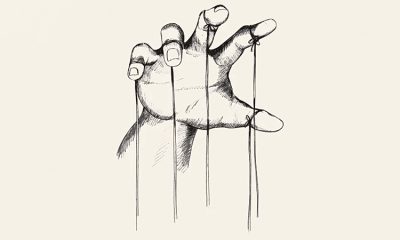
 Opinion7 days ago
Opinion7 days agoA puppet show?
-

 Business22 hours ago
Business22 hours agoClimate risks, poverty, and recovery financing in focus at CEPA policy panel
-

 Opinion4 days ago
Opinion4 days agoLuck knocks at your door every day
-
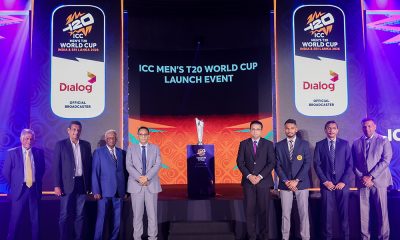
 Business6 days ago
Business6 days agoDialog Brings the ICC Men’s T20 Cricket World Cup 2026 Closer to Sri Lankans
-
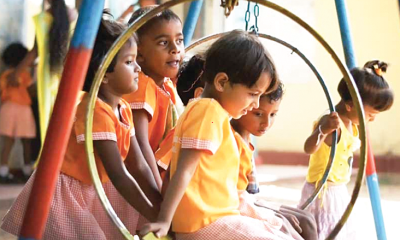
 Features7 days ago
Features7 days ago‘Building Blocks’ of early childhood education: Some reflections













